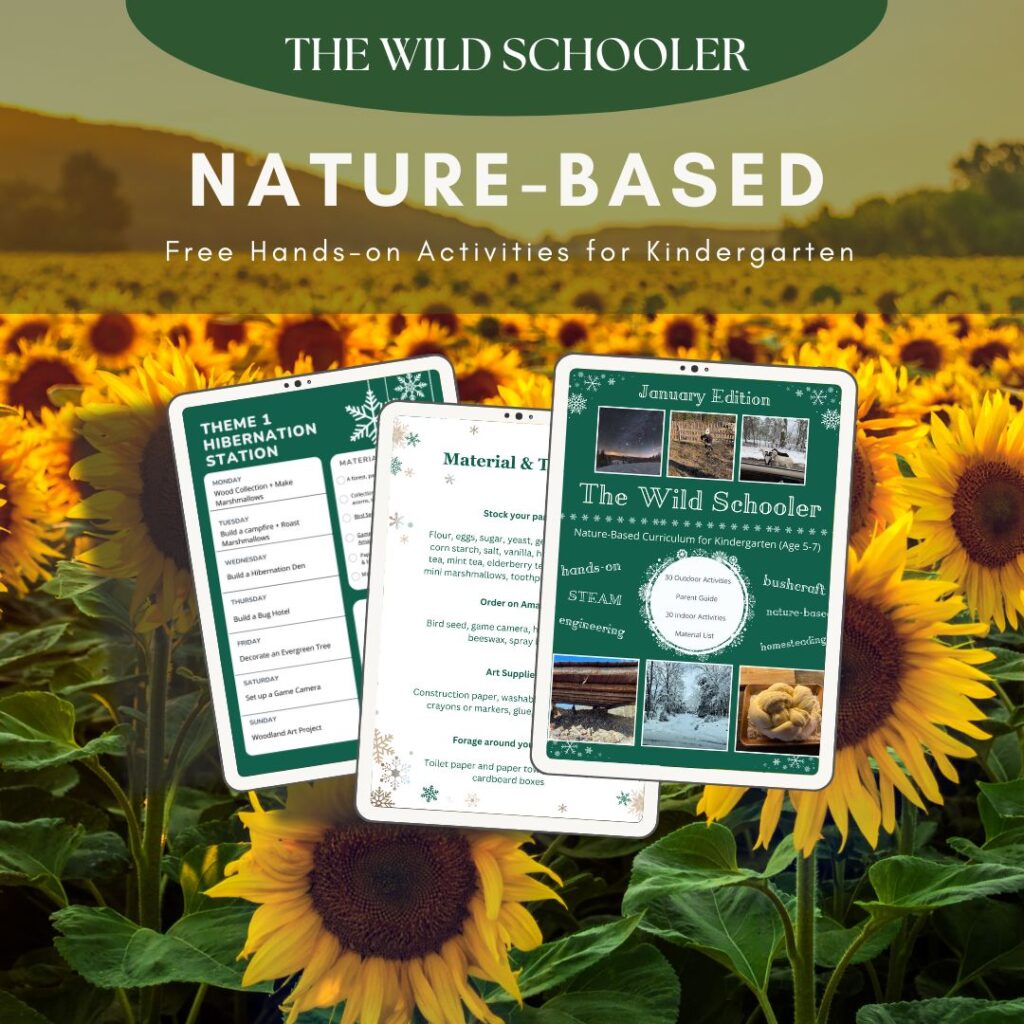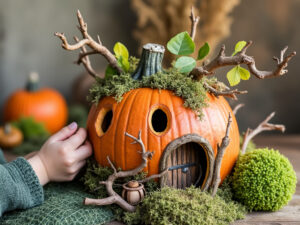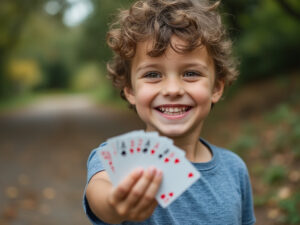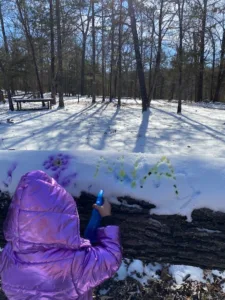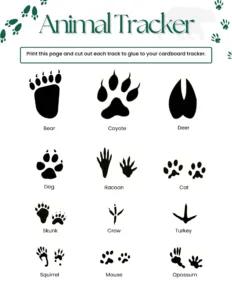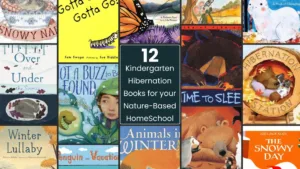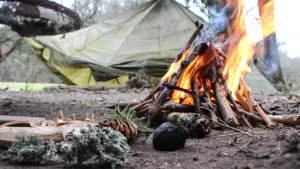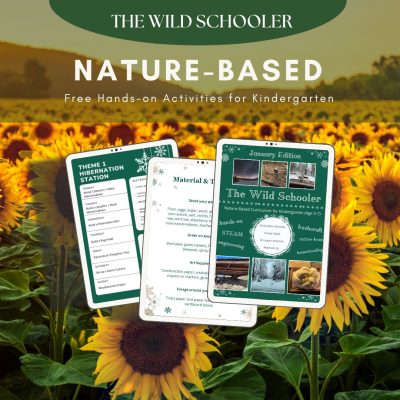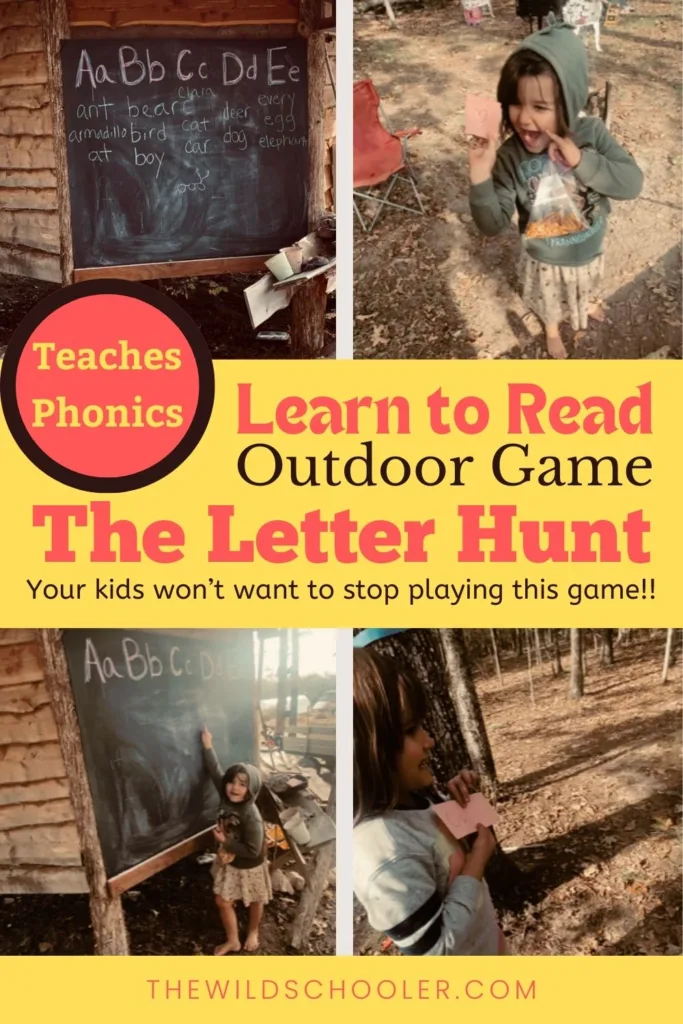
Engaging children in a fun phonics game outdoors that promotes reading skills is not only enriching but also tremendous fun. “The Letter Hunt” game is a perfect blend of adventure, education, and teamwork. In this step-by-step guide, we’ll take you through this fun phonics game, designed to enhance letter recognition, phonemic awareness, vocabulary, and word-sound association, all while immersing children in the joys of outdoor exploration. Let’s dive right in!
@thewildschooler Here is a fun phonics game that your kindergartener will love playing and will help them identify letters, build phonemic awareness and do word sound association. All while running around and tiring themselves out so your afternoons are more relaxing. 😉 We will be posting more fun outdoor activities this week including building a wildflower garden and pumpkin fairy houses that double as bird feeders. Follow if you’re also homeschooling kindergarteners on your homestead and need activities that burn lots of energy! #naturebasedlearning #kindergartenhomeschool #funphonics #phonicsgames
♬ Bitter Sweet Symphony – Extended Version – The Verve
Step 1: Prepare for the Fun Phonics Game
Before you start, gather the necessary materials: pieces of paper, a marker or chalk, a chalkboard or dry erase board, and an eraser. You’ll also need a group of enthusiastic kids ready for an outdoor adventure.
Step 2: Writing the Letters
On the pieces of paper, write down the letters of the alphabet (start with a few, like 5, for the first round) in large, bold letters. Be sure to write both uppercase and lowercase versions. Make sure the letters are legible and easy to read.
Step 3: Hiding the Letters
Head outdoors, whether it’s your backyard or a nearby forest. As a parent or teacher, strategically hide the paper letters in various spots, ensuring they’re well-disguised but still accessible for children to find. Make a mental note of where you’ve hidden each letter.
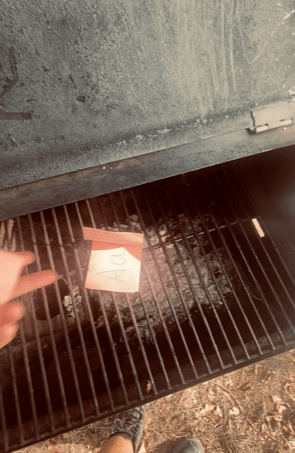
Step 4: Duplicating Letters on the Chalkboard
Now, replicate the same letters on the chalkboard or dry erase board. It’s great if you have an outdoor chalkboard or mobile dry erase board that you can bring with you outside but if not, you can do this part of the game inside. Place the board where all the kids can easily see it. Have the eraser handy for later.
Step 5: The Letter Hunt
Now, it’s time to actually play this fun phonics game! Start by encouraging the kids to search for the hidden letters. Once they find a letter, they should collect it and keep it with them.
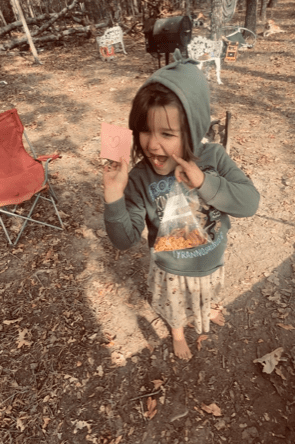
To make sure that everyone gets a chance to participate and find some letters, it’s a great idea to assign each child a specific number of letters to search for. For example, you can instruct each child to find two letters before stopping. This way, everyone has an opportunity to be actively involved in the game, and it prevents one child from finding all the letters.
Assigning a limit also encourages teamwork and cooperation among the kids, as they can share their discoveries and work together to find all the letters. Once each child has found their designated number of letters, gather them and move on to the next steps. This ensures that everyone is engaged and excited to participate in the upcoming activities.
Remember, the goal is not only to have fun with this outdoor phonics game, but also to foster a collaborative learning environment. So, encourage the kids to work as a team in their quest to find the hidden letters.
Step 6: Letter Identification
With all the letters collected, gather the kids around the chalkboard. Call out the first letter, for instance, “Who has the letter A?” The child who found the letter A responds, “I do!”
Identifying the letters they’ve found is a crucial step in the “Letter Hunt” game. It serves as the foundation for building essential reading skills and provides several key benefits for your children’s literacy development:
Letter Recognition:
Recognizing individual letters is the first step in learning to read. Children need to become familiar with the visual forms of letters to later connect them with their sounds and meanings. The more exposure they have to letters, the quicker they’ll grasp their significance in reading.
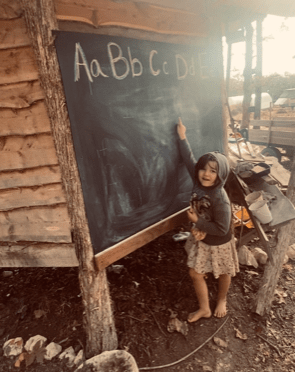
Preventing Letter Confusion:
It’s common for young children to confuse similar-looking letters like ‘b’ and ‘d’ or ‘p’ and ‘q.’ By actively participating in letter identification, children can gradually overcome these confusions and gain confidence in distinguishing between different letters.
Letter identification is a vital skill in early reading development. It provides the building blocks for understanding the relationships between letters, sounds, and words. By incorporating it into the game, you’re making the learning process engaging and enjoyable for your children, setting them on a path to becoming proficient readers.
Step 7: Letter Sound Exploration
Now, take the opportunity to dive into the world of phonics. Ask everyone, “What sound does ‘a’ make?” The kids eagerly call out the answer and imitate the sound.
Now, how does knowing what sound the letters make help your child learn to read?
Phonemic Awareness:
Once a child knows the letters, they can start to understand that each letter represents a specific sound. This is known as phonemic awareness, a fundamental skill for reading. By asking, “What sound does ‘a’ make?” during the game, you’re introducing this concept in a fun and memorable way.
Letter-Sound Association:
This fun phonics game helps children associate letters with their corresponding sounds. This association is vital when they begin blending sounds together to form words. The more they practice identifying letters and their sounds, the smoother their reading journey will be.
Step 8: Word Association
To reinforce the letter-sound connection, encourage the kids to brainstorm words that begin with the same sound. For example, if you’re working with the letter A, kids might suggest “apple,” “alligator,” and “ant.”
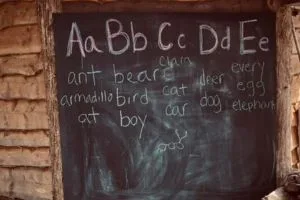
This word association step plays a crucial role in developing several essential reading skills. Here’s why it’s important and the skills it helps nurture:
Vocabulary Expansion:
By encouraging children to brainstorm and share words that begin with the same sound as the letter they found, you’re expanding their vocabulary. This is vital for reading comprehension as a richer vocabulary allows them to understand and connect with a wider range of texts.
Phonemic Awareness:
The process of thinking about words that start with a specific letter sound sharpens a child’s phonemic awareness. They learn to isolate the initial sound in words, a key skill for phonics and reading readiness.
Word-Sound Association:
As children suggest words that start with the letter sound, they start to understand the connection between the written letter and the sound it represents. This association is fundamental for reading because it enables children to decode and read words independently.
Language and Communication Skills:
The word association step promotes active participation and verbal communication among children. It encourages them to express their thoughts, listen to others, and engage in collaborative learning. These communication skills are not only important for reading but also for overall social and academic development.
Step 9: Writing on the Board
If you have older kids who can write, have them come up to the chalkboard or dry erase board and write down the suggested words. If not, you can do the writing for them.
Step 10: Repeat as Long as They’re Having Fun
Repeat these steps for each letter that was found during the hunt. The game can be played multiple times or until the kids start to lose interest. Typically, a round of “The Letter Hunt” with 5 letters takes about 20 minutes.
By stopping when kids start to lose interest, you preserve the enthusiasm and joy associated with the game. Forcing them to continue when they’re no longer engaged could lead to frustration and potentially create negative associations with learning.
“The Letter Hunt” game is a holistic and engaging approach to foster crucial reading skills in children, and it’s a true adventure that incorporates outdoor learning and movement. Through this exciting game, children acquire a myriad of vital skills:
- Letter Recognition: Identifying letters forms the foundation for reading. It ensures that kids are well-acquainted with the building blocks of words.
- Phonemic Awareness: Exploring letter sounds helps children understand that letters have unique sounds. This skill is pivotal for breaking down and blending words when reading.
- Vocabulary Expansion: The word association step enriches their vocabulary, allowing them to comprehend a broader range of texts and connect with the world around them.
- Word-Sound Association: Learning to associate letters with sounds is fundamental for decoding and reading independently.
- Communication Skills: The game encourages verbal interaction and collaboration among children, nurturing essential communication skills that extend beyond reading.
- Memory and Cognitive Development: Remembering letters, sounds, and words enhances memory and cognitive skills, which are invaluable for effective reading.
Moreover, the combination of outdoor learning and physical movement makes the learning experience even more enjoyable and aids retention. Outdoor settings stimulate curiosity and engagement. Movement enhances memory and focus while making learning fun. It’s vital because children retain information better when they’re actively involved and having a good time. “The Letter Hunt” takes reading preparation beyond mere letters and sounds; it encompasses the joy of exploration, teamwork, and a lifelong love for learning. So, let’s get outside, have fun, and watch our young readers blossom into confident, skilled, and enthusiastic learners.

